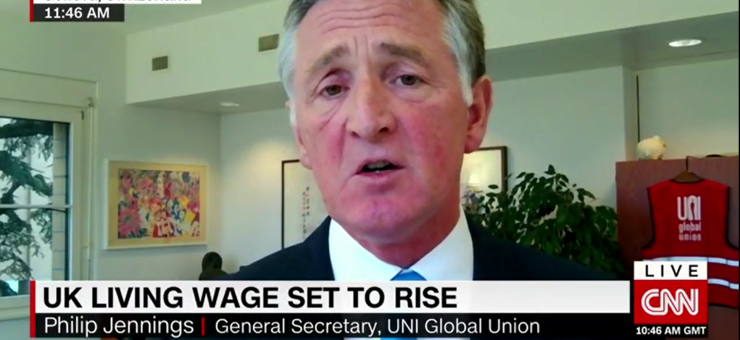News
Jennings tells CNN: “Workers need a pay rise!”

General Secretary of UNI Global Union Philip Jennings welcomed the increase in the London Living Wage in an interview with CNN Money journalist Nina dos Santos. Yesterday, the UK Living Wage Foundation announced an increase in this important pay benchmark. Whilst the measure is not mandatory, Jennings echoed the call of the TUC to business in the UK to “get behind the increase and pay a living wage”.
“The living wage initiative addresses some of the fundamental issues at the heart of UK and world economics over the last two decades,” said Jennings. “The shrinking share of labour income in the wealth produced means that we have alarming levels of income inequality. In the last decade, we have over 550 million workers who have seen their wages stagnate or fall.”
“The current system of wage fixing is bust and workers are the big losers. Even more worrying is the fact that many people who are in work are still beneath the breadline. In the UK alone, there are 6 million people who are earning less than the minimum wage and are classified as ‘the working poor’. UK prospects do not improve when you consider that there are almost one million people on zero hour contracts. This is symptomatic of a fall in job quality. In Europe one in four workers are at risk of living in poverty. Worldwide, one in two workers are in vulnerable employment. More has to be done to end the epidemic of the working poor, but the living wage is a good starting point.”
“We are pleased to see that business in the UK has signed up in growing numbers, with over 3000 signed up. We hope that the Confederation of British Industry now gets behind this initiative. It’s good for the economy, it’s good for business, and most importantly, it’s good for workers. The living wage will bring back some economic and wage justice to the workplace.”
When questioned about the potential impact of Brexit on workers, Jennings commented, “There is a definite Brexit phenomenon – the repercussions loom large for a great deal of working people. The Resolution Foundation reports that the combination of flat wages, changes in welfare, wage freeze in the public sector coupled with Brexit will mean that people could be between £2000 and £4000 worse off by 2020.”
“The anguished voice of working people has largely been ignored, and for economic justice, workers need a voice on pay. Around the world, we have seen a falloff in the extent of collective bargaining and we see a correlation between this fall in collective bargaining coverage and inequality. We need more, not less collective bargaining.”
“The social contract is bust. We must implement wage setting mechanisms which will ensure that workers feel the benefits of growth. The pendulum has swung too far to capital since the late 70s. The wage share of the income produced has gone down and is now at its worst level in generations, whilst the capital share has increased.”
“The Fight for 15 in the United States and the Living Wage campaign in the UK show that wage justice is a pressing issue. At our Cape Town Congress in 2014 we adopted the slogan, ‘workers need a pay rise’. Today, policy makers and businesses are starting to come around to the idea that if we are going to get the global economy moving again, workers need more money in their pockets for them to enjoy a decent life.”
“These global wage trends confirm that the trickle down theory so enthusiastically supported in political and business circles has not worked, as millions are worse off today than they were a decade ago.”

